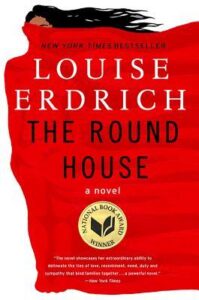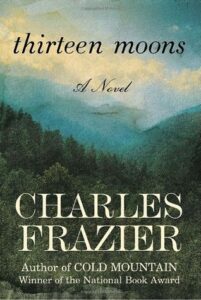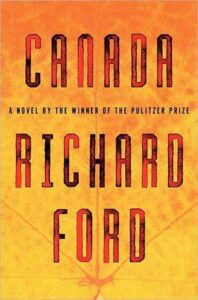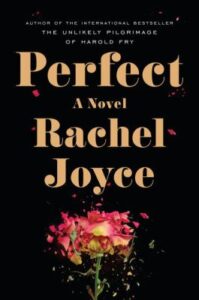Title: The Round House
Author: Louise Erdrich
Page Count: 321 pages
Genre: Coming of Age Stories, Literary Fiction
Tone: Reflective, Moving, Bleak
Summary from publisher:
One Sunday in the spring of 1988, a woman living on a reservation in North Dakota is attacked. The details of the crime are slow to surface because Geraldine Coutts is traumatized and reluctant to relive or reveal what happened, either to the police or to her husband, Bazil, and thirteen-year-old son, Joe. In one day, Joe’s life is irrevocably transformed. He tries to heal his mother, but she will not leave her bed and slips into an abyss of solitude. Increasingly alone, Joe finds himself thrust prematurely into an adult world for which he is ill prepared. While his father, who is a tribal judge, endeavors to wrest justice from a situation that defies his efforts, Joe becomes frustrated with the official investigation and sets out with his trusted friends, Cappy, Zack, and Angus, to get some answers of his own. Their quest takes them first to the Round House, a sacred space and place of worship for the Ojibwe. And this is only the beginning.
SPOILER WARNING:
These book discussion questions are highly detailed and will ruin plot points if you have not read the book.
Questions composed by MPPL Staff
The Library is happy to share these original questions for your use. If reproducing, please credit with the following statement: 2015 Mount Prospect Public Library. All rights reserved. Used with Permission.
1. The Round House is a book for which a sentence or two summary cannot fully capture the experience it holds. How would you describe the feel of reading this story?
2. As you read, were you conscious of the fact that it was an older Joe looking back on this summer? Did that impact the narrative for you?
3. This work has been described as a coming-of-age story. In what ways are Joe’s experiences universal? In what ways are they specific? Does this category do justice to the narrative?
4. One of the ways a typical adolescence is explored is through sexual curiosity and preoccupation. Were you at all uncomfortable with these depictions in a story that is incited with a brutal sexual assault? Was this intentional?
5. The Round House deals with some deeply troubling themes and struggles. How was that balanced? Were there elements that lightened the story for you?
6. Describe Joe’s friendship with Cappy. What did he add to the story?
7. Is Joe proud of his heritage? What does this narrative have to say about cultural identity?
8. Much of the complication for Geraldine’s case is the question of jurisdiction. How does the legal relationship between the U.S. and the Ojibwe complicate the investigation?
9. Why didn’t Geraldine simply lie and say she knew where it happened? Do you agree with her reasons?
10. When Joe makes his decision, he says it is about justice, not vengeance. What do you think? How does that decision change him? Does his decision change your perception of him?
11. One reviewer shared, “In Erdrich’s hands, you may find yourself, as I did, embracing the prospect of vigilante justice as regrettable but reasonable, a way to connect to timeless wisdom about human behavior. It wasn’t until I put the book down that I recognized – and marveled at – the clever way I had been manipulated.” Was your experience similar to that of the reviewer? Does this affect your assessment of the book and/or the author?
12. How would you describe Father Travis and his role in the story?
13. Near the end of the story (p.306), Joe’s father talks of “ideal justice as opposed to the best-we-can-do justice”. What did he mean? How is this borne out in the story?
14. What else did Joe’s father want him to understand from that conversation? Did he make his point?
15. What was the importance of the wiindigoo motif?
16. Do you feel you have a good understanding of what Geraldine was like before the incident? How does the author convey this?
17. At one literary festival panel, during a discussion of the general lack of strong marriages in fiction, author Lorrie Moore said she felt the marital life of Joe’s parents was a central part of The Round House. In what ways would you agree or disagree with this statement?
18. What were the most uncomfortable scenes for you? Did these lessen your enjoyment of the book as a whole?
19. What was the significance and the symbolism of the Round House? Why choose this as the title?
20. How would you describe the author’s writing style and storytelling choices?
21. At the conclusion of the novel, when Joe’s parents are driving him home and they don’t stop at the roadside café, Erdrich writes, “we passed over in a sweep of sorrow that would persist into our small forever. We just kept going.” What do you think she meant?
22. The Round House won the National Book Award and was later selected for Book Crossing, a shared reading program between Mount Prospect Public Library and our sister city, Sèvres, France. What elements make this book a good choice for discussion?
- Other Resources
- LitLovers guide
- Video of National Book Award honors
- NY Times Q&A with Louise Erdrich
- Resource guide from Minnesota Book Awards
- “Erdrich’s ‘Round House’ a Moving Tale of Dark Justice” from The Harvard Crimson
- From Chicago Reader: “Who’s to blame for violence against Native women?“
If you liked The Round House, try…
- Thirteen Moons by Charles Frazier
- Canada by Richard Ford
- Perfect by Rachel Joyce





